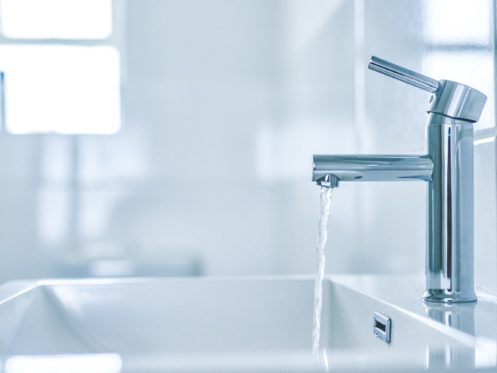There’s nothing like enjoying a refreshing glass of cool, clear water on a hot day in San Diego. Sometimes, though, the appearance of the water coming into your home is more cloudy than clear. Many people reach out to us at Tarpy Plumbing, Heating & Air with concerns that their cloudy tap water is unsafe to drink. Although this is true on rare occasions, the fact is that most cloudy water has simple causes that shouldn’t be a cause for concern. At the same time, most homeowners at least like to know why their water is cloudy. If you’ve noticed cloudy water coming from your tap, here are a few things to test for and a few suggestions to help you correct this issue.
A Word About Water Pressure
Water pressure is one of the most important considerations when it comes to cloudy water. High water pressure can introduce air into your water, making it appear cloudy. It’s important to note that high water pressure can cause other problems beyond cloudy water. If the water pressure is too high, it will put excess pressure on your water supply lines, potentially leading to premature failure. Fortunately, you may be able to control the water pressure that comes into your home. Your local water company can likely come to your home and adjust the water pressure where your home connects to the city water supply. You can also put a pressure regulator on your main water supply to help solve a variety of problems.
Air Bubbles
In most cases, when you have cloudy water, it’s because of excess air bubbles in the water. Except for a few instances, the air bubbles enter your water because of high water pressure coming into your home. As the water rushes through your pipes and out through the fixtures, the excess pressure agitates the water more, introducing more air along the way. Since the air is heavily agitated, the bubbles are small, making the individual bubbles almost undetectable. Thus, when you see the water, it merely looks cloudy without looking like it’s full of tiny bubbles.
Dissolved Minerals
If you live in an area that’s prone to hard water, you may also experience cloudy water because of an excess of dissolved minerals in your water supply. Calcium is one of the most common minerals present in hard water. If the water company doesn’t properly regulate the calcium levels, the water will appear cloudy or milky since calcium has a whitish appearance. Even if you’ve never experienced hard water before, you may still have issues with excess dissolved minerals that are a result of the treatment process that the water goes through as it’s being disinfected.
How Old Is Your Water Heater?
Another way that excess minerals can enter your water is through your water heater. If the cloudy water condition only happens when you use hot water, mineral deposits in your water heater are likely getting into your water and coming through the tap. Some of the minerals present in decaying water heaters can be harmful if ingested. Therefore, it’s important to have someone from Tarpy Plumbing, Heating & Air take a look at your water heater if you suspect that you might have a problem. Generally, if you’re not drinking the water from your water heater, cloudy water is still safe to use for showers, washing clothes, and washing dishes though the cleaning power of the water might not be as strong as normal.
What About Gas Leaks?
On a rare occasion, you may have cloudy water because of methane gas in the water. This condition is most often caused by a sewer or gas line leak. Although methane itself is odorless, you may notice a strong smell coming from the water if other gases are dissolved along with the methane. If you can reliably rule out the other causes of cloudy water, then it’s important to call your local water company to schedule a test of your home’s water supply. While you wait for the test, do not drink the water in your home or use it for cooking.
How to Fix Hard Water
Assuming that hard water in your home is a long-running problem, installing a water softener is the best course of action. A water softener uses resin beads and other compounds to attract and retain the dissolved minerals in the water that make it “hard.” Once the water softener is up and running, you should notice your water starting to clear up. When using a water softener, it’s important to have Tarpy Plumbing, Heating & Air properly balance the levels of the softening agents so that you don’t end up with foul-tasting water.
When to Replace a Water Heater
Since a water heater can be the culprit behind some cloudy water, it’s important to know when you should have Tarpy Plumbing, Heating & Air replace your old water heater. Conveniently, cloudy water is one major indication that your water heater is on its last legs. If sediments and minerals are leaving the water heater’s tank, it means that the anode rod that’s designed to prevent corrosion in the tank has failed and that the walls of your water heater are starting to corrode instead of the rod. Along with cloudy water, you might also notice water on the floor underneath the water heater. This indicates that the corrosion has entirely eaten through the tank, and you need to replace the water heater immediately.
What About Air Bubbles?
If having excess air bubbles in your water bothers you, there are a few things you can do. When you fill a glass with water, you can let it sit while giving it a few shakes to allow the air bubbles to escape. The water will gradually clear from the bottom to the top of the glass. On individual faucets, it may also be helpful to add aerators if they aren’t already installed. In addition to reducing water pressure and helping prevent bubbles, aerators can help reduce your water consumption to help you save money on your water bill.
Other Water Quality Problems
Aside from cloudy water, be on the lookout for other quality issues that may be affecting the water coming into your home. If the water from the faucet has a rusty color, for example, it may be because the water heater is releasing rust into the water supply. You may also have a bad pipe fitting that’s releasing rust into the water. Water that appears darker in color could be the result of activated charcoal added to the water by the water company. Typically, charcoal is added when there are other quality issues that normal treatment chemicals can’t correct. Of course, if you ever have any concerns about your home’s water quality, you can always give Tarpy Plumbing, Heating & Air a call.
Keeping Your Water Clear
Whether you have water clarity issues or a clogged drain, Tarpy Plumbing, Heating & Air can help fix the problem. We can also install toilets, detect and fix leaks, and perform a variety of other plumbing services. On top of that, we can install, repair, and maintain furnaces and air conditioners. We have an A+ rating with the Better Business Bureau and countless five-star ratings that attest to our integrity and professionalism. To learn more about improving your home’s water quality, contact us at Tarpy Plumbing, Heating & Air today.


 SPECIALISTS
SPECIALISTS

